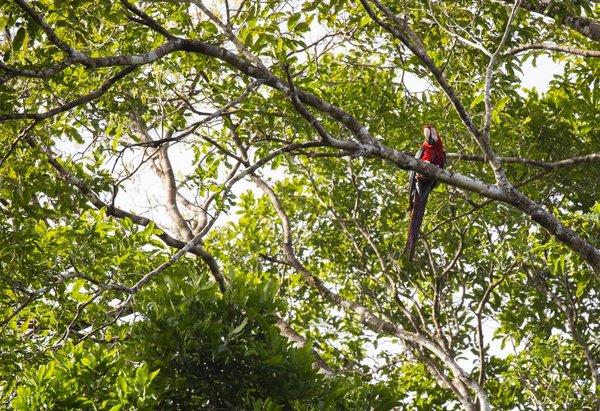 Read this article in French
Read this article in French- Share this article
- Subscribe to our newsletter
New UN World Restoration Flagships
In February 2023, the UN Environment Programme (UNEP) and the Food and Agriculture Organization of the UN (FAO) named seven initiatives from Africa, Latin America, the Mediterranean and South Asia as UN World Restoration Flagships. Together, the seven new flagships are expected to restore nearly 40 million hectares − an area almost 600 times the size of Nairobi − and create around 500,000 jobs.
The World Restoration Flagship awards are part of the UN Decade on Ecosystem Restoration – led by UNEP and FAO – which aims to prevent, halt, and reverse the degradation of ecosystems on every continent and in every ocean. The awards track notable initiatives that support global commitments to restore one billion hectares – an area larger than China.
In 2022, the inaugural ten World Restoration Flagships were recognised as part of the UN Decade on Ecosystem Restoration, to be followed with similar efforts every two years until 2030. This year’s World Restoration Flagships are part of an accelerated investment in nature by governments and private donors, notably reflected in USD 1.4 billion provided last year by the Global Environment Facility (GEF) Council.
The new seven World Restoration Flagships are:
Restoring Mediterranean Forests Initiative
The Initiative, involving Lebanon, Morocco, Tunisia and Türkiye, has led to around two million hectares of forests restored across the region since 2017, with over eight million hectares planned for restoration by 2030. The initiative is supported by FAO’s Committee on Mediterranean Forestry Questions – Silva Mediterranea, the governments of Lebanon, Morocco, Tunisia, and Türkiye, and The Association for Forests, Development and Conservation Lebanon (AFDC).
Living Indus
The Living Indus initiative was approved by Pakistan’s parliament in the wake of the devastating 2022 climate change-induced floods and was officially launched at the UN Climate Change Conference in Sharm el-Sheikh (COP27). It aims to restore 25 million hectares of river basin by 2030, encompassing 30 per cent of Pakistan’s surface area through the implementation of 25 high-impact interventions for policy-makers, practitioners and civil society. Partners in this initiative include the Government of Pakistan, FAO and other UN agencies.
Acción Andina social movement
This movement is inspired by the Peruvian conservation non-profit organisation ECOAN (Asociacion Ecosistemas Andinos) and powered by the US-based non-profit Global Forest Generation. It is scaling up a community reforestation model which has proved itself over the past two decades as a cost-effective solution for climate resilience plans to restore and grow 30 million trees by 2030 across a vegetative band spanning almost 800,000 hectares in Argentina, Bolivia, Chile, Colombia, Ecuador, Peru and Venezuela. The initiative ultimately aims to protect and restore a forest area of one million hectares by 2045. 25,000 people from remote Andean communities are already engaged in restoring 5,000 hectares and protecting over 11,000 hectares of Andean forests.
Sri Lanka Mangrove Regeneration Initiative
The initiative is science-driven, co-led by local communities and focused on restoring the natural balance in the ecosystem. Since the initiative was launched in 2015, efforts have already resulted in 500 hectares of restored mangroves, benefiting 150 households. Some 10,000 hectares are slated for restoration by 2030, with 5,000 households to benefit and more than 4,000 new jobs to be created. Partners in this initiative include the Sri Lanka Ministry of Environment and the governments of Australia, the UK and the USA.
Terai Arc Landscape Initiative
The Terai Arc Landscape Initiative has focused on restoring the forests of critical corridors of the Terai Arc Landscape. The restoration of 66,800 hectares of Nepal’s forests, as well as other measures, has improved the livelihoods of about 500,000 households in Nepal. It also supported the tiger population in the landscape shared by India and Nepal. Development is expected to continue as almost 350,000 hectares will be restored by 2030. The World Wide Fund for Nature (WWF) Nepal is the primary partner in this initiative, supporting the Nepalese government.
Regreening Africa
The Regreening Africa initiative has been using proven agroforestry techniques, adapted to suit the needs of farmers under varying socio-ecological contexts in the past two decades, to restore over 350,000 hectares in Ethiopia, Ghana, Kenya, Mali, Niger, Rwanda, Senegal and Somalia. By 2030, a further five million hectares are planned to be restored. The initiative is expected to benefit more than 600,000 households. It is also increasing carbon storage, boosting crop and grass yields, makes soil more resilient (preventing floods) and treating it with fixed nitrogen that acts as a natural fertiliser. Partners in this initiative include CARE Nederland, Catholic Relief Services, CIFOR-ICRAF, Oxfam, Regreening Africa, Sahel Eco and World Vision Australia.
Forest Garden Program
The Forest Garden Program, launched in 2015, includes multiple Forest Garden projects in Cameroon, the Central African Republic, Chad, The Gambia, Kenya, Mali, Senegal, Uganda and Tanzania. Through researched agroforestry techniques, unsustainable farming practices are replaced, and nature regenerates, as farmers receive essential training, supplies and equipment for their success. By planting tens of millions of trees every year, the programme aims at expanding from 41,000 restored hectares today to 229,000 hectares by 2030, supporting many more through 230,000 jobs created.Partners in this initiative include Trees for the Future.
(UNEP/ile)
More information:





Add a comment
Be the First to Comment